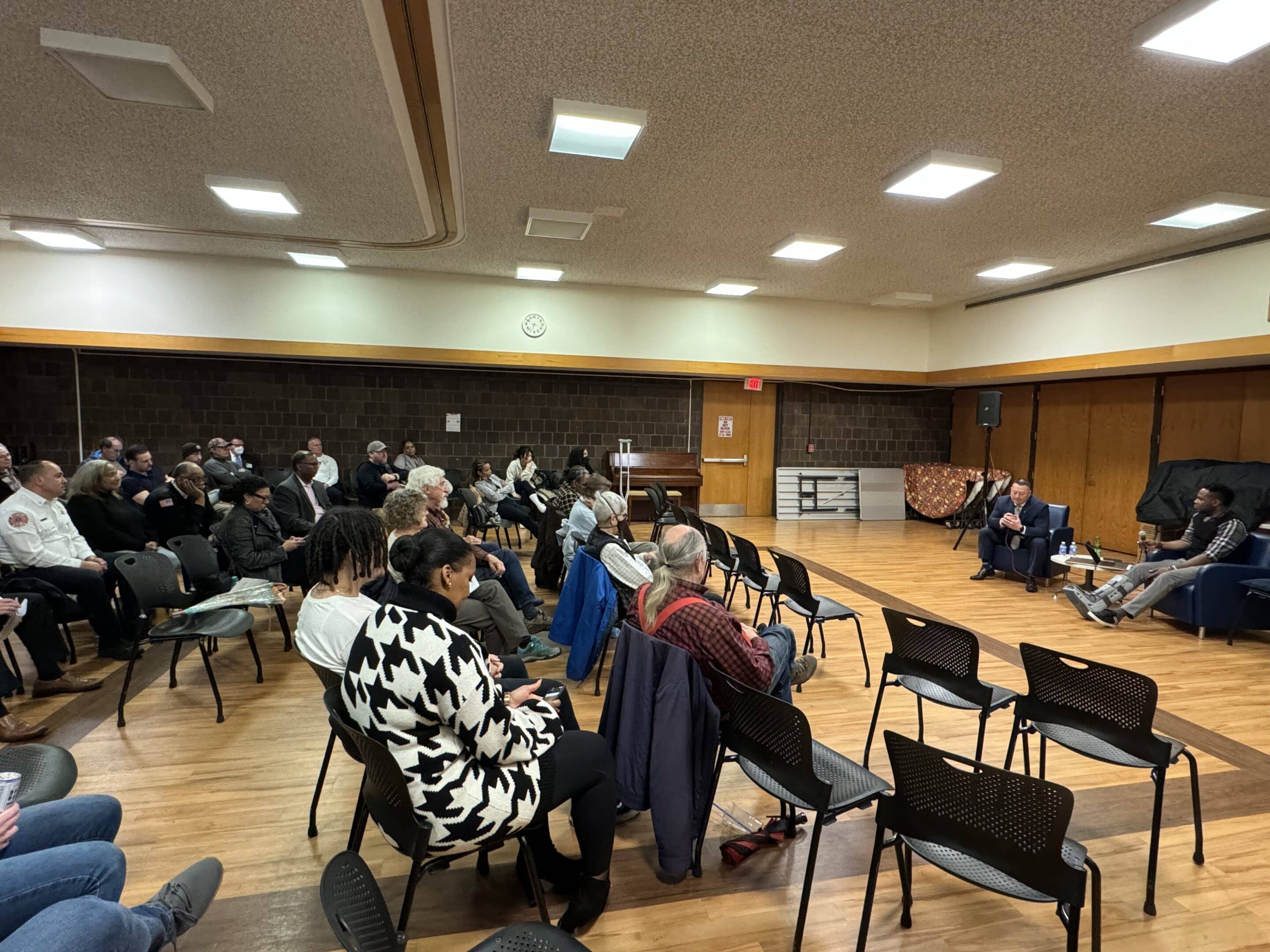Amherst conducted a public meet and greet session with police chief candidates Gabriel Ting and Todd Ahern.
Reminder Publishing photo by Trent Levakis
AMHERST — The two finalists for the position of Amherst police chief met with the public through a “meet and greet” session on April 2 where both candidates spoke about their backgrounds and answered questions from the public inside the Bangs Community Center.
Finalists Todd Ahern, a lieutenant in the Chelmsford Police Department, and Gabriel Ting, a captain and current temporary chief of the Amherst Police Department, both had separate hour-long sessions where they become more formal with the community and through questions had discussions about what they would bring to the position.
Both candidates were forwarded as finalists for the position from the Police Chief Search Committee. The town also previously hosted listening sessions to collect community feedback on what the public was eyeing in a new chief.
Ahern was the first candidate to meet with the public and discussed his background as an officer and why he was the right fit for Amherst. Ahern has worked 30 years for the Chelmsford Police Department and is currently serving as the lieutenant in charge of community wellness and outreach.
Ahern started as a patrol officer for Chelmsford in 1994, became a detective in 2000, was promoted to sergeant in 2004 and then to lieutenant in 2015. He holds a bachelor of science in criminal justice and a master of arts in criminal justice from the University of Massachusetts Lowell.
In 2021, Ahern earned a public leadership credential from the Harvard Kennedy School of Government. In addition, Ahern has coached youth wrestling, lacrosse and soccer programs in Chelmsford.
“My style would be helpful, service-based, respectful, right? Seeking input, not only from the people in the department, but from community members. I want you to be active participants in the way we deliver police services,” Ahern said.
Ahern added he aims to make the police as accessible as possible to residents and compared the service aspect of a police department to running a business. He also mentioned he would be very proactive on a street level to engage with the community if hired.
One of the questions that came for both candidates was focused on how as the new chief, would each candidate interact with the town’s Community Responders for Equity, Safety and Service department, also known as CRESS. Created in 2022, the unarmed public safety department’s mission is to support the community as an alternative to police and is “rooted in trauma-informed and anti-racist frameworks.”
“It’s anti-racist, right? I would want to use all those words for the way I want my police services,” Ahern said on addressing concerns of racism. “I want it to be equitable. Safety is our main concern. I want it to be service-based. I want it to be helpful. I want it to be respectful, but as far as anti-racism, it’s a no brainer.”
Ahern was also asked how he would plan on leading a police force in a college town like Amherst. He explained Chelmsford had a UMass-Lowell campus at one point where he got experience working with a school and that university’s police staff. He did acknowledge coming to Amherst would be a different animal, though, and that it would take some time for him to become more familiar with the campuses.
Ahern also spoke about his experiences as an officer and his understanding of his privilege as a white man born and raised in Chelmsford. He said for his personal life, he is married to someone who is African American and they have two children who are biracial. He added he appreciates that the three people he cares for most all have dealt with racism in ways he has never had to consider.
“I know how it affects them,” Ahern said. “It’s also personal for me.”
He reiterated his goals for combating racism is creating a police culture where racism is not only condemned but stopped. He added that through various trainings over the years, he has considered the impartial bias police training one of the most beneficial to officers as it helps them understand implicit bias and recognize when people feel racialized harm.
When opened for Ting’s portion of the meet and greet, Ting spoke about his connection he has built over the years with the town as an employee of the Amherst Police Department for over 26 years. Ting has served as Temporary police chief since the retirement of previous Chief Scott Livingstone last year.
Ting started as a patrol officer in 1997, became a Detective in 2004, was promoted to sergeant in 2010 and then to lieutenant in 2016. Ting holds a bachelor of arts degree in sociology with a concentration in criminal justice from the University of Massachusetts Amherst and a master of science in criminal justice administration from Western New England University.
Ting is also a certified instructor under the Massachusetts Criminal Justice Training Council and has taught at various police academies. In addition, Ting has coached youth lacrosse and hockey in the region and serves on the Ancestral Bridges Foundation Board of Directors.
Ting explained in his introduction he is the child of parents who fled China for South American before eventually arriving to the U.S. Ting was born in Buenos Aires, Argentina. Ting also included in his opening remarks that since he joined the department in the 90’s, it has always been his goal to spend his career for the department and retire as an Amherst officer.
“I lucked out that this community was so diverse,” Ting said. “This town certainly welcomed me in and my family in.”
Ting reflected on his experience thus far in the temporary role and while out of respect for his temporary title he has waiting to dive full in on how he can impact the department until the town decides on the full-time role.
“The biggest thing that I’ve learned in this 10 months being the chief of police, is that I have to have big ears and a little mouth,” Ting said. “I really need to be able to listen to the community and the community needs.”
Ting also spoke about how some of the issues of distrust between the community and its police have stemmed from a lack of accessibility to the department for the public.
“There is no accessibility to the Police Department, and that resonated with me,” Ting said, reflecting on previous incidents in town in which a citizen may have tried to bring concerns or complaints to the attention of the department. “That’s why I’ve always thought to myself, ‘Well, if I become the chief of police, I will have that ability to try and change that.”
Later during Ting’s time an individual representing the Amherst Police Supervisors Union read a statement endorsing Ting.
Recording of the full meet and greet sessions with both candidates is expected to be available on the town of Amherst YouTube channel.



